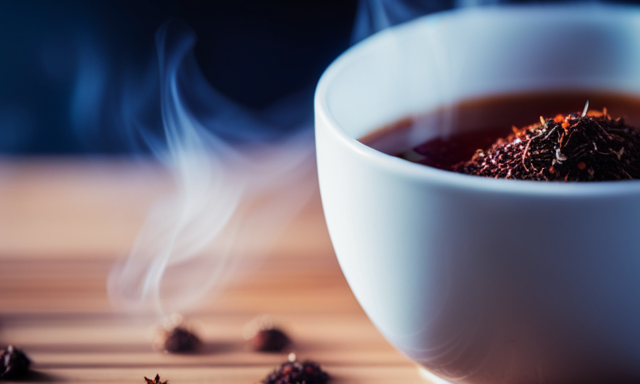As I sat down to enjoy a cup of rooibos tea, a thought crossed my mind: just how healthy is this beverage? With its rich red color and unique flavor, rooibos has gained popularity as a health-conscious choice. But does it live up to its reputation?
In this article, we will delve into the nutritional composition of rooibos and explore its potential health benefits. Through scientific studies, we will uncover the role of antioxidants in promoting overall well-being and the impact of rooibos on blood sugar regulation. Additionally, we will examine the digestive health benefits and the potential for weight management that rooibos may offer.
However, it is important to consider any potential considerations and precautions associated with consuming rooibos. By the end of this article, we will have a clearer understanding of whether rooibos is indeed a healthy choice.
Key Takeaways
- Rooibos tea is rich in antioxidants, including aspalathin and nothofagin, which help protect cells from damage and promote cellular health.
- The antioxidants in rooibos tea may help protect against chronic diseases such as cancer and cardiovascular disease.
- Rooibos tea has anti-aging effects, including neutralizing free radicals that contribute to skin aging and promoting collagen production for improved skin elasticity.
- Rooibos tea can help regulate blood sugar levels, improve insulin sensitivity, and reduce the risk of type 2 diabetes.
Nutritional Composition of Rooibos
You might be surprised by the impressive nutritional composition of rooibos! Despite being a herbal tea, rooibos contains a wide array of beneficial nutrients.
It is rich in antioxidants, such as aspalathin and nothofagin, which help protect the body against oxidative stress and chronic diseases.
Rooibos is also a good source of minerals like potassium, calcium, magnesium, and zinc. Additionally, it contains trace amounts of essential minerals like iron, copper, and manganese.
One of the notable features of rooibos is its absence of caffeine, making it a suitable choice for individuals who are sensitive to stimulants or looking to reduce their caffeine intake. However, it is important to note that excessive consumption of rooibos may have potential risks, such as adverse effects on liver function.
Moving on to potential health benefits, rooibos has been associated with improved heart health and reduced inflammation.
Potential Health Benefits
When it comes to potential health benefits, rooibos has been found to contribute to improved heart health, reduced inflammation, and enhanced digestion.
Studies have shown that the antioxidants present in rooibos can help lower blood pressure and cholesterol levels, reducing the risk of heart disease.
Additionally, the anti-inflammatory properties of rooibos have been linked to a reduction in chronic inflammation, which is associated with various diseases.
Lastly, the polyphenols found in rooibos can aid in digestion by promoting the growth of beneficial bacteria in the gut.
Improved Heart Health
Feeling the warm embrace of a cup of rooibos tea, you’ll discover that it is a heart-healthy elixir that nurtures your cardiovascular system. Here are three ways that rooibos can improve heart health:
-
Improving Cholesterol Levels: Studies have shown that drinking rooibos tea can help lower LDL cholesterol levels, commonly known as ‘bad’ cholesterol. By reducing LDL cholesterol, rooibos tea promotes a healthier balance of cholesterol in the body.
-
Reducing Blood Pressure: Rooibos tea contains compounds that can help relax blood vessels and promote better blood flow. This can lead to a reduction in blood pressure levels and lower the risk of developing hypertension.
-
Boosting Antioxidants: Rooibos tea is packed with antioxidants, such as aspalathin and quercetin, which can protect the heart from oxidative stress and inflammation.
As we explore the benefits of rooibos tea, let’s now delve into its potential for reducing inflammation.
Reduced Inflammation
Experience the soothing power of a cup of rooibos tea as it works to reduce inflammation in your body. Research suggests that rooibos contains powerful antioxidants that can help to reduce pain and inflammation. These antioxidants, such as aspalathin and nothofagin, have been shown to have anti-inflammatory properties, which can help to alleviate symptoms of conditions like arthritis and asthma. Additionally, rooibos tea has been found to support the immune system, helping to regulate the body’s inflammatory response.
Incorporating rooibos tea into your daily routine may provide natural relief from inflammation and promote overall well-being.
| Antioxidant | Reduces Pain | Immune System Support |
|---|---|---|
| Aspalathin | ✔️ | ✔️ |
| Nothofagin | ✔️ | ✔️ |
| Other | ✔️ | ✔️ |
With its ability to reduce inflammation and support the immune system, rooibos tea may also contribute to enhanced digestion.
Enhanced Digestion
Incorporating rooibos tea into your daily routine can improve digestion. Studies have shown that its antioxidants enhance the digestive system’s function and aid in relieving symptoms such as bloating and indigestion.
Here are four ways rooibos tea supports improved gut health and provides digestive system support:
-
Anti-inflammatory properties: Rooibos tea contains polyphenols, which have anti-inflammatory effects on the digestive system. This helps reduce inflammation and promotes a healthier gut.
-
Antioxidant power: The antioxidants found in rooibos tea protect the digestive system from oxidative stress, which can lead to digestive issues. These antioxidants also help break down food more efficiently.
-
Soothing effect: Rooibos tea has a calming effect on the digestive system. It soothes irritation and reduces discomfort associated with digestive problems.
-
Probiotic support: Rooibos tea contains prebiotic fibers that promote the growth of beneficial gut bacteria. This improves overall gut health and digestion.
Scientific studies on rooibos have demonstrated its positive effects on various aspects of health, including digestion. Moving forward, let’s explore the scientific evidence supporting the health benefits of rooibos tea.
Scientific Studies on Rooibos
In my research on the scientific studies conducted on rooibos, I’ve found various animal studies, human studies, and clinical trials exploring its potential health benefits.
Animal studies have demonstrated that rooibos has antioxidant properties and may have anti-inflammatory effects.
Human studies have suggested that rooibos may help improve blood sugar control and reduce the risk of heart disease.
Clinical trials have also shown promising results in terms of its potential anti-cancer properties.
Animal Studies
Animal studies have shown that rooibos has numerous health benefits. These studies have examined the effects of rooibos on animals’ overall well-being, including their physical and mental health. One key advantage of rooibos is its positive impact on animal welfare. It has been found to enhance immune function, reduce stress levels, and improve digestion in animals.
Additionally, rooibos has a minimal environmental impact, making it a sustainable option for animal consumption. These studies provide valuable evidence that rooibos can contribute to the overall health and well-being of animals.
Moving on to human studies, research has also been conducted to explore the potential health benefits of rooibos for humans, which will be discussed in the next section.
Human Studies
Discover the incredible benefits that rooibos can bring to your overall well-being and enhance your immune function, reduce stress levels, and improve digestion.
Human studies have shown promising results regarding the positive effects of rooibos on various aspects of health. However, it is important to note that these studies are still limited, and more research is needed to fully understand the potential benefits.
Some studies have reported potential side effects, such as liver problems and allergic reactions, but these are rare occurrences.
In terms of recommended daily intake, experts suggest consuming up to six cups of rooibos tea per day to experience its potential health benefits.
Moving forward, clinical trials will provide more valuable insights into the efficacy of rooibos in promoting overall wellness.
Clinical Trials
Try participating in clinical trials to gain valuable insights into the potential benefits of rooibos on your overall well-being.
Clinical trial design plays a crucial role in determining the effectiveness of rooibos in promoting health. Researchers carefully plan and execute these trials to ensure accurate and reliable results.
During the trials, participants are randomly assigned to different groups, some receiving rooibos and others receiving a placebo. Data analysis is then performed to compare the outcomes between the groups. This rigorous process helps to eliminate bias and provide objective evidence on the effects of rooibos.
By participating in clinical trials, you can contribute to the growing body of knowledge about rooibos and its impact on health. This information will help us better understand the role of antioxidants in promoting overall well-being.
Role of Antioxidants in Health
In this discussion, I will explore the role of antioxidants in overall health.
Antioxidants have the ability to scavenge free radicals, which are unstable molecules that can cause damage to our cells.
Research suggests that a diet rich in antioxidants may offer protection against chronic diseases such as heart disease, cancer, and neurodegenerative disorders.
Additionally, antioxidants have been linked to potential anti-aging effects, as they help combat oxidative stress and promote cellular health.
Free Radical Scavenging
Rooibos tea’s ability to fight off harmful free radicals is due to its well-known antioxidant properties. These antioxidants help neutralize unstable molecules and prevent oxidative stress in the body. Free radicals are naturally produced during normal bodily processes, but they can also be generated by external factors like pollution, smoking, and a poor diet.
The damage caused by free radicals to our cells and DNA can lead to various health problems and accelerated aging. However, the antioxidants found in rooibos tea act as scavengers, helping to protect our cells from this damage. This protective effect is crucial for maintaining overall health and may even contribute to the prevention of chronic diseases.
Transitioning into the next section, rooibos tea’s ability to protect against chronic diseases is another reason why it is considered a superfood.
Protection against Chronic Diseases
One of the reasons rooibos tea is hailed as a superfood is its ability to safeguard against chronic diseases. Studies have shown that it contains powerful antioxidants that help protect against cancer and prevent the development of chronic diseases. These antioxidants, such as aspalathin and nothofagin, have anti-inflammatory and anti-carcinogenic properties, reducing the risk of cancer. Rooibos tea also has a positive impact on heart health by reducing cholesterol levels and blood pressure, contributing to the prevention of cardiovascular disease. With its numerous health benefits, it is no wonder that rooibos tea is considered a valuable asset in promoting overall well-being.
Moving on to the next section, let’s explore the anti-aging effects of rooibos tea.
Anti-Aging Effects
Discover the delightful effects of sipping on this remarkable red elixir to fight the signs of aging and achieve a radiant, youthful glow. Rooibos tea offers a multitude of anti-aging benefits, making it a popular choice for those seeking skin rejuvenation.
Packed with antioxidants, such as aspalathin and nothofagin, rooibos tea helps neutralize harmful free radicals that contribute to skin aging. These antioxidants also promote collagen production, improving skin elasticity and reducing the appearance of wrinkles and fine lines.
Additionally, rooibos tea contains alpha hydroxy acid, which gently exfoliates the skin, removing dead cells and promoting a smoother complexion. The anti-inflammatory properties of rooibos further aid in reducing redness and inflammation associated with aging skin.
Transitioning into the subsequent section, rooibos tea also has a positive impact on blood sugar regulation.
Impact on Blood Sugar Regulation
Sipping on a fragrant cup of rooibos tea can help regulate blood sugar levels, ensuring a steady and balanced energy throughout the day. Research suggests that rooibos tea may have a positive impact on blood sugar regulation and insulin response. One study conducted on rats showed that the consumption of rooibos tea reduced blood sugar levels and improved insulin sensitivity. Another study on humans found that rooibos tea had a similar effect, lowering blood sugar levels and reducing the risk of type 2 diabetes.
To better understand the potential impact of rooibos tea on blood sugar regulation, let’s take a look at a comparison table:
| Blood Sugar Levels | Insulin Response | Energy Levels | |
|---|---|---|---|
| Rooibos Tea | Decreased | Improved | Balanced |
| Other Beverages | Unchanged | Unchanged | Fluctuating |
As we can see from the table, rooibos tea stands out in its ability to lower blood sugar levels and improve insulin response, leading to balanced energy levels throughout the day.
Moving on to the next section about the ‘anti-inflammatory properties’, it is important to note the potential benefits of rooibos tea in reducing inflammation and promoting overall health.
Anti-Inflammatory Properties
Now let’s talk about the anti-inflammatory properties of rooibos. As someone always on the lookout for natural remedies to support my overall health, I am intrigued by the potential benefits of this herbal tea.
Anti-inflammatory foods are known to help reduce inflammation in the body, which is a common cause of various chronic diseases. Rooibos contains a unique compound called aspalathin, which has been found to have anti-inflammatory effects.
This means that incorporating rooibos into my diet may help to reduce inflammation and promote better overall health.
As I continue to explore the health benefits of rooibos, I am excited to learn more about its potential digestive health benefits.
Digestive Health Benefits
Can incorporating rooibos into your daily routine provide relief from common digestive issues? Rooibos tea has several digestive health benefits. It can help relieve indigestion, stomach cramps, and diarrhea due to its anti-inflammatory and antispasmodic properties.
Rooibos is also known to support the growth of beneficial gut bacteria, which can improve overall digestive health. However, it is important to note that rooibos tea may have potential side effects, such as liver damage and allergic reactions, especially when consumed in excessive amounts. To avoid these risks, it is recommended to limit your daily intake of rooibos tea to no more than six cups.
Moving forward, let’s explore the potential for weight management with rooibos tea.
Potential for Weight Management
Looking to manage your weight more effectively? Incorporating rooibos tea into your daily routine may just be the solution you’ve been searching for. Here are three reasons why rooibos tea has the potential to support weight management:
-
Natural appetite suppressant: Rooibos tea contains compounds that can help reduce cravings and promote feelings of fullness, making it easier to control calorie intake.
-
Metabolism booster: Studies have shown that rooibos tea can increase metabolism, enhancing the body’s ability to burn calories and potentially aid in weight loss.
-
Long-term effects: Regular consumption of rooibos tea has been associated with improved metabolic health and decreased risk of obesity-related diseases, such as diabetes and heart disease.
To experience the potential weight management benefits of rooibos tea, it is important to consume it in moderation. While there is no specific optimal dosage, enjoying a few cups throughout the day can be a good starting point.
Transitioning into the next section, it is important to consider some considerations and precautions when incorporating rooibos tea into your weight management routine.
Considerations and Precautions
Before incorporating rooibos tea into your weight management routine, it’s important to be aware of a surprising statistic: a study found that excessive consumption of rooibos tea may lead to liver damage in rare cases.
While rooibos tea is generally considered safe and has a low risk of side effects, it’s crucial to exercise caution and moderation. Some individuals may experience allergic reactions to rooibos tea, such as skin rashes or respiratory issues. Additionally, rooibos tea has been found to have a mild estrogenic effect, which could potentially impact hormone-sensitive conditions.
It’s always advisable to consult with a healthcare professional before incorporating rooibos tea into your weight management routine, especially if you have any underlying health conditions or are taking medications. Taking these precautions and being aware of potential side effects will help you make an informed decision about whether rooibos tea is a healthy choice for you.
Now, let’s move on to the conclusion: is rooibos a healthy choice?
Conclusion: Is Rooibos a Healthy Choice?
Considering the potential considerations and precautions associated with rooibos consumption, it is important to draw a conclusion about whether or not it is a healthy choice. In my opinion, rooibos can indeed be a healthy choice, but it is crucial to understand its effects on hydration and caffeine intake.
Rooibos is a great option for hydration due to its high water content. Staying hydrated is essential for overall health, and rooibos can help in achieving this goal.
Additionally, rooibos is naturally caffeine-free, making it a suitable alternative for individuals who are sensitive to or trying to reduce their caffeine intake.
To summarize, rooibos can be a healthy choice as it provides hydration and is caffeine-free. However, as with any beverage, moderation is key. It is always wise to consult with a healthcare professional to ensure rooibos is suitable for your individual health needs.
Frequently Asked Questions
Are there any potential side effects or interactions of rooibos with certain medications or health conditions?
There are potential drug interactions and side effects of rooibos, depending on the medications and health conditions. It is important to consult with a healthcare professional before consuming rooibos if you have any concerns.
Can rooibos help with sleep or relaxation?
I investigated the theory that rooibos can help with sleep or relaxation. While there is limited research, some studies suggest that rooibos may have anxiety-reducing properties and could potentially aid in stress relief.
Is rooibos safe for children and pregnant women?
Rooibos is generally safe for infants and pregnant women when consumed in moderation. However, it’s important to consult with a healthcare professional before introducing it to infants or if you’re pregnant, as individual circumstances may vary.
Does rooibos have any effects on skin health or beauty?
Rooibos has been found to have several effects on skin health. Studies show that its antioxidants help fight free radicals, reducing signs of aging. Additionally, the tea’s anti-inflammatory properties may benefit hair growth.
How does the taste of rooibos compare to other teas?
Rooibos tea has a distinct taste that is often described as earthy, sweet, and nutty. Compared to other teas, it stands out for its unique flavor profile, making it a popular choice among tea drinkers. Its rich taste also makes it versatile for culinary uses like infusing desserts or creating flavorful sauces.
Conclusion
In conclusion, after examining the nutritional composition and scientific studies on Rooibos, it is evident that this vibrant red tea holds potential health benefits.
Its rich antioxidant content may contribute to improved blood sugar regulation and digestive health.
While it may not directly aid in weight management, it can be a healthier alternative to sugary beverages.
However, it is important to note individual considerations and potential precautions.
So, if you’re looking for a delicious and potentially beneficial tea option, Rooibos could be an enjoyable choice to incorporate into your routine.










